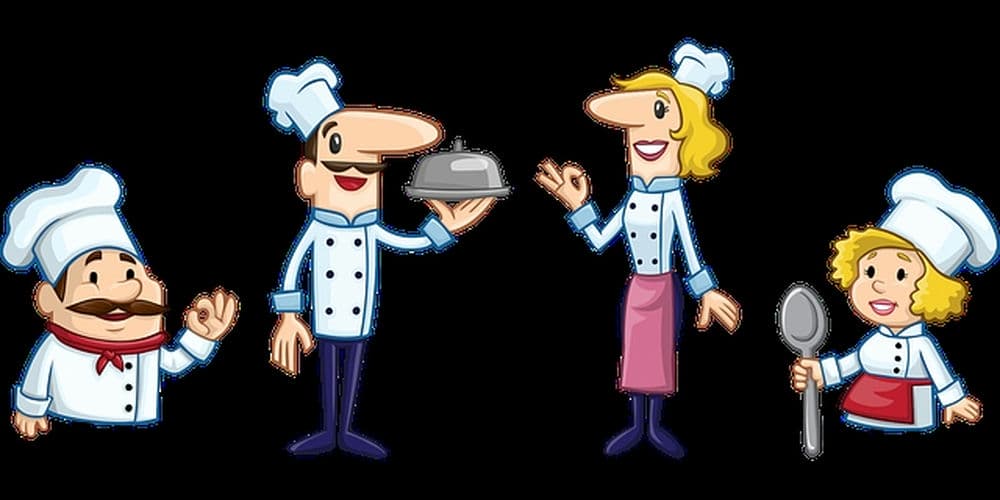

Intro to Nutrition Education can be (a) daunting task! Knowing what to eat and how much is essential for proper nutrition. But many people (don't) understand the importance of eating healthy, and this can have drastic consequences on their health. The path to becoming an accomplished chef requires continuous learning, unwavering dedication and patience through the challenging yet rewarding process. Food Science Food safety practices. Traveling to sample flavors and techniques from different world cuisines can inspire innovation and growth for aspiring chefs. How to become a chef Catering services. Therefore, introducing them to nutrition education is a must.
First off, it's important to emphasize that everyone needs a balanced diet - not just some people! Finding employment as a private chef provides the opportunity to craft customized menus and creatively prepare meals for families. Food Science Travel and exploration. As you advance in your culinary career, focus on developing your own unique cooking style and specialty dishes that showcase your talents. How to become a chef Cooking techniques. Eating right means getting all the necessary nutrients from fruits, vegetables, grains, proteins and fats in appropriate proportions. This will provide our bodies with energy and help protect us against illness and diseases.
Once we've established this basic understanding of nutrition, it's time to move onto more specific topics such as food groups, portion size and recipes. Teaching kids about the various food groups will allow them to better recognize healthy eating options. Additionally, teaching them about portion size helps them learn how much of each type of food they should be consuming per meal or snack. Finally, providing easy-to-follow recipes enables kids to make tasty meals that are also good for their health!
Moreover, it's crucial for students to (learn) about dietary restriction for those who suffer from chronic illnesses like diabetes. It's vital that these individuals get adequate amounts of certain vitamins while avoiding foods that could worsen their condition. Furthermore, discussing other common nutritional issues such as obesity or anemia can help students gain a deeper insight into nutrition in general.
In conclusion, introducing students to proper nutrition education is essential for creating healthier lifestyles throughout life! With clear guidance on selecting nutritious foods along with helpful tips on maintaining a balanced diet - everyone will benefit from learning valuable information about nutrition!

Nutrition Education (NE) is a key factor in keeping people healthy. It has numerous benefits, such as improved eating habits and helping to prevent chronic diseases. Not only can it help with physical health, but mental health too! Neglecting healthy eating habits can lead to obesity, heart disease, diabetes and other illnesses. With NE, individuals have the knowledge they need to make healthier choices (which can be hard!).
Moreover, NE teaches about balanced meals and portion control. For instance, knowing that one cup of cereal is considered a serving size helps you understand what is an appropriate amount of food for one meal. Furthermore, learning about nutrition helps people modify their diets according to their lifestyle preferences or medical needs. Transition phrase: However, the benefits don't stop there!
NE also provides information on food safety; how to store them correctly so they won't go bad or cause foodborne illness! It's important to know expiration dates and temperatures for proper storage of food. Additionally, NE educates people on how nutrition affects their daily lives by providing energy and essential vitamins and minerals needed for growth and development! Lastly, it encourages individuals to make smart decisions when choosing snacks - opting for healthy options rather than processed ones!
Overall, Nutrition Education offers many advantages that we should all take advantage of! We must remember that good nutrition leads to better health outcomes - both physically and mentally - so let's not forget this valuable tool!


Cooking is an art that requires practice and patience to master. (No matter your skill level) It is never too late to get hands-on experience in the kitchen, and with a little bit of effort, you can become quite adept at it!. Learning through trial and error can be very beneficial; however, it takes time to perfect your technique.
Despite the challenges of learning how cook by oneself, there are many advantages!
Posted by on 2023-09-03

Becoming certified in your area of expertise can be a great way to hone your skills and stand out from the competition.. It's not always easy, however, as certifications often require significant time and effort. (It) Nevertheless, with the right dedication and enthusiasm, becoming certified can open up many new opportunities!
First off, one must identify their particular field of expertise.
Posted by on 2023-09-03

Food safety is an important consideration for everyone in the food industry.. It's essential for all involved to develop an understanding of safe practices (such as proper storage, temperature control and sanitation) to ensure the health and well-being of both customers and employees.
Posted by on 2023-09-03

Working abroad for a diverse experience can be an incredibly rewarding and exciting opportunity.. It can open up new doors and provide many unique experiences unavailable in one’s own country. (However,) it is important to consider the potential risks and drawbacks associated with working in a foreign setting.
Posted by on 2023-09-03

Pursuing employment opportunities with established chefs can be an exciting and rewarding experience.. It is important to consider apprenticeships with experienced chefs, as they provide a unique opportunity for aspiring cooks to learn the basics of cooking and gain valuable kitchen skills.
Posted by on 2023-09-03
Nutrition education is an important part of promoting healthy eating habits. It provides people with the knowledge and skills necessary to make smart decisions about food. There are several types of nutrition education which can be used to help achieve this goal.
One type of nutrition education is classroom-based instruction. This includes lessons taught in a traditional school setting, such as health classes or physical education courses. This kind of instruction helps children learn about healthy eating habits and how to apply them in their daily lives. It also teaches them how to read food labels and understand portion sizes, so they can make healthier choices when shopping for groceries.
Another option is community-based nutrition programs, which are designed to educate people on the importance of good nutrition in their neighborhoods. These programs often include cooking demonstrations and classes that teach participants how to prepare meals using nutritious ingredients. They may provide information on available resources for purchasing affordable, healthier foods from local stores or farmers markets as well. Furthermore, they may offer incentives such as free produce or coupons for discounted items at grocery stores (to encourage people) to buy more nutritious foods!
Finally, there are individualized nutrition interventions which focus on providing personalized advice based on each person's dietary needs and goals. These interventions typically involve one-on-one sessions with a qualified professional (such as a registered dietitian) where individuals receive tailored guidance on meal planning and other lifestyle changes needed for improved nutritional health.
Overall, there are numerous types of nutrition education available today that provide individuals with the tools they need to develop healthier eating habits! With the right program in place, everyone can benefit from learning more about proper nutrition and making smarter food choices!


Nutrition education is an important component of health promotion and disease prevention. It can be challenging to implement it effectively in a variety of settings, but there are strategies that can make it more successful. Firstly, it's crucial to assess the needs and resources in each environment. This will help determine what type of nutrition education should be offered (e.g., group presentations, individual counseling, etc.).
Next, create a plan that outlines the goals and objectives for the program as well as detailed steps that need to be taken to achieve these goals. Ensure that all stakeholders involved understand their roles and responsibilities for implementation. Also consider incorporating activities that will provide feedback on program progress and ensure effective communication between all parties involved (e.g., newsletters or webinars).
Additionally, use available resources such as evidence-based materials to support your nutrition education initiatives. These materials can help promote positive behavior change by providing practical tips and advice related to nutrition topics. Furthermore, leverage technology like interactive apps or websites to engage learners with multimedia content such as videos or podcasts!
Finally, monitor outcomes by tracking data such as attendance at workshops or changes in knowledge levels after completing nutrition education programs. This will provide insight into the effectiveness of the initiative so adjustments can be made if necessary.
(Transition) In conclusion, implementing nutrition education requires thoughtful planning and evaluation; however, with careful consideration given to assessing needs, creating plans, utilizing resources, leveraging technology and monitoring outcomes - success is achievable!
Nutrition Education is a very important topic in today's society. It is something that needs to be taken seriously, as it can have an effect on all aspects of our lives! Unfortunately, there are still some (challenges) faced when trying to educate people about proper nutrition. One major challenge is the lack of knowledge; many individuals simply don't know what they should be eating and how much. Additionally, they may not understand why certain foods are better for them than others and how eating the right meals can benefit them in the long run.
Another obstacle in teaching proper nutrition is time constraints; often times, people feel like they don't have enough hours in the day to prepare healthy meals or even learn more about nutrition. This could lead to unhealthy habits such as skipping meals or relying on processed food that may not provide adequate nutrients. Furthermore, people might find it difficult to adhere to their nutritional plan due to financial restrictions or peer pressure from those with different dietary choices.
Moreover, accessibility can also be a problem when it comes to getting proper nutrition education. Not everyone has access to supermarkets or health stores where they can purchase fresh ingredients for healthier meals. Additionally, information regarding nutrition might not always be readily available due to language barriers or lack of resources in certain areas.
All these challenges make educating people on proper nutrition quite a daunting task! But with dedication and commitment from both educators and learners alike, these issues can be overcome and everyone can reap the benefits of good nutrition!

Nutrition education is an important part of health care. It provides the knowledge and skills necessary for people to make informed decisions about their diet and nutrition. There are many resources available to help educate individuals on proper nutrition, such as books, websites, classes, seminars, and workshops.
Books like "The Joy of Cooking", "What to Eat" and "Eat This Not That" provide helpful information on healthy eating habits. Websites such as The Nutrition Source from Harvard Medical School can give a wealth of information about different foods and what they contain. Classes at local universities or community centers can teach how to create balanced diets as well as cooking techniques. Seminars and workshops are also available that focus specifically on topics such as vegetarianism or weight management.
In addition, there are numerous cookbooks that feature recipes designed with nutritional value in mind! Many grocery stores have nutritionists on staff who can provide advice on healthy food choices. Also, there are lots of apps available that offer tips and tricks for healthier eating habits!
Overall, there are many resources available to aid in nutrition education. Whether you're looking for a quick tip or want an in-depth look at food and nutrition science, there's something out there for everyone! Furthermore, by utilizing all these options you will be able to learn more about the importance of proper nutrition and how to apply it into your everyday life. Ultimately this will lead to better health outcomes!

Nutrition education is an important part of leading a healthy life. It helps us to make better food choices and encourages us to exercise more. But (unfortunately!) it seems that not everyone is getting the nutrition education they need. Studies show that many people are still unaware of the types of foods they should be eating, and how much they should eat.
Furthermore, there are still too many people who don't understand the impact that their diets have on their health and well-being. This lack of knowledge can lead to serious health problems in the future! Therefore, it's essential for everyone to get proper nutrition education so they can learn how to best take care of themselves.
In conclusion, nutrition education is crucial for individuals to understand what's best for their bodies and overall health. It may seem like a daunting task but with the right instruction, everybody can take steps toward becoming healthier! With proper nutrition education, we will all be able to make smarter decisions regarding our lifestyles and live longer lives! Consequently, we must all strive towards making sure everyone has access to proper nutrition education! That way we'll all benefit from improved health outcomes!
Nutrition education is essential for living a healthy lifestyle. It's important to understand what foods are good for you, and how to make nutritious meals (with limited time and resources). Referencing credible sources can help us stay informed about the latest nutrition research.
First off, journal articles from reputable organizations such as the Academy of Nutrition and Dietetics, or the American Heart Association provide up-to-date information on nutritional topics. Additionally, books written by accredited experts in nutrition science can be helpful resources. Government websites like choosemyplate.gov also offer useful insight into proper nutrition habits!
However, not all sources are reliable when it comes to nutrition advice. Popular media outlets can often overhype fad diets or give incorrect information that may lead to poor health outcomes. Also, people should take caution when seeking out nutritional advice on social media platforms; although there are some qualified professionals sharing credible content online, most posts have not been verified by professional bodies and could contain dangerous misinformation.
In summary, references for nutrition education should come from dependable sources such as scholarly journals, expert books and government websites! To ensure safety and accuracy of any dietary changes one makes based off this type of research, consulting with a registered dietitian is always recommended!